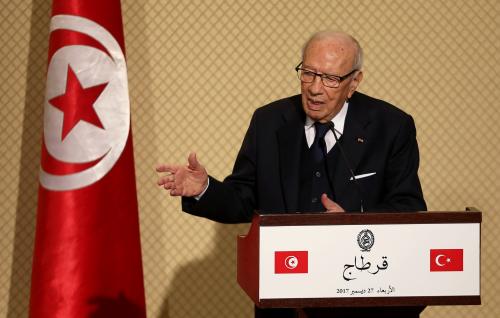Tunisia’s Prime Minister-designate, Youssef Chahed, is expected to announce his cabinet this week. He’ll face many challenging tasks, the hardest of which may be to restore trust in the Arab world’s only democratically-elected government. This post originally appeared on Lawfare.
Tunisia’s Prime Minister-designate, Youssef Chahed, is expected to announce his cabinet this week, well ahead of the September 3 deadline. Chahed, who was appointed by President Beji Caid Essebsi on August 2 after former prime minister Habib Essid failed to win a no confidence vote, has a tremendous burden on his shoulders. Should he succeed in forming a government and winning parliament’s approval, he will be expected to shepherd a legislative agenda that includes addressing Tunisia’s rapidly deteriorating economic situation and developing safeguards against future terror attacks. Chahed has said publicly that he will prioritize fighting corruption and “winning the war on terrorism.” But his most challenging task may be to restore trust in the Arab world’s only democratically-elected government.
While Tunisia’s commitment to the democratic process is regularly lauded by outside observers, including me, Tunisian trust in their government has reached staggeringly low levels, suggesting that the democratic experiment is far from complete. During interviews with Tunisians from across the political spectrum both in and outside government in June, I noticed a high level of frustration with parliament. The internal party jockeying, which brought about Essid’s ouster, has led to both legislative inaction and a corresponding decline in public confidence. Younger Tunisians, in particular, characterized parliament as ineffective and out of touch with their needs. As one official told me, “there is a wall between youth and the state.” Many of the youth with whom I spoke acknowledged that over the past few years they have withdrawn from politics entirely, abstaining from voting and quitting political parties. Those who wish to remain political often do so through civil society or informal activism, rather than the formal political sphere.
In a country where one-third of young people are unemployed and 6,000-7,000 people have left to join ISIS, appealing to youth is not simply a tool to win votes (particularly since the youth tend to stay away from the ballot box), but rather a national security necessity. Chahed seems to understand this point and has promised to prioritize the needs of youth. But his younger age at 41 – in contrast to Essid, who is 67 – will not likely be sufficient to gain the trust of the Tunisian public.
As polling data shows, Tunisians from all age groups have lost faith in their government. According to IRI’s latest poll, nearly 60% of Tunisians believe the government is doing “nothing” to advance their interests. Similarly, the latest wave of the Arab Barometer found that only 20% of Tunisians have confidence in parliament. The numbers are even worse among youth. The Arab Barometer reported that youth (age 18-34) are “17 points less likely to trust the government than those who are 35 and older.”
It will not be easy for Chahed to overcome these trends as he is starting his tenure with two major disadvantages. First, he is reportedly distantly related to President Essebsi, through marriage. Although Essebsi denies these reports, the mere suggestion that he would appoint a relative as prime minister has turned off many Tunisians, including some within Essebsi’s Nidaa Tounes party. The party suffered a major split earlier this year due, in large part, to speculation that Essebsi was maneuvering to put his son, Hafedh, into the party’s leadership role.
Also not helping his case is Chahed’s apolitical background. Like his predecessor, Chahed is a technocrat with a background in agriculture. Although he served as minister of local affairs in the Essid government, for most of his career he has worked as an expert in international agricultural policies, advising the UN, EU and United States on agricultural development. While his strong international connections have earned him praise abroad, his work for foreign governments does not elicit the same positive feelings at home. Furthermore, his inexperience in the political arena has led to speculation that the president, not the prime minister, will be pulling the strings.
Chahed is right to focus his attention on corruption. A daunting task, he must walk the line between moving forward (i.e. removing the culture of corruption that was carried over from the Ben Ali regime) and dealing with the past (i.e. providing the Tunisian people with a mechanism for transitional justice and reconciliation). Efforts at drafting an economic reconciliation law have so far been met with anger by civil society and mass protest. Chahed should work with civil society to develop a law that satisfies the public’s need for closure on the crimes of the former regime.
Any successful security legislation will also require public buy-in. Here, Chahed must balance protecting the Tunisian people’s safety with safeguarding their hard-won freedoms. But even if Chahed’s government is able to make the legislative progress Essid’s government could not, without addressing the issue of public trust and support, Tunisia’s democratic success will remain under threat.
The Brookings Institution is committed to quality, independence, and impact.
We are supported by a diverse array of funders. In line with our values and policies, each Brookings publication represents the sole views of its author(s).







Commentary
Can Tunisia’s new prime minister overcome the trust deficit?
August 11, 2016